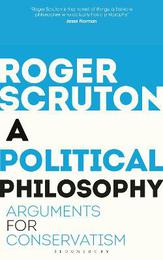
|
A Political Philosophy: Arguments for Conservatism
Paperback / softback
Main Details
| Title |
A Political Philosophy: Arguments for Conservatism
|
| Authors and Contributors |
By (author) Sir Roger Scruton
|
| Physical Properties |
| Format:Paperback / softback | | Pages:224 | | Dimensions(mm): Height 216,Width 135 |
|
| Category/Genre | Social and political philosophy |
|---|
| ISBN/Barcode |
9781472965226
|
| Classifications | Dewey:320.01 |
|---|
| Audience | |
|---|
|
Publishing Details |
| Publisher |
Bloomsbury Publishing PLC
|
| Imprint |
Bloomsbury Continuum
|
| Publication Date |
7 March 2019 |
| Publication Country |
United Kingdom
|
Description
Over the past twenty years, Roger Scruton has been developing a conservative view of human beings, society and culture. The tone of this book is positive and the arguments are recommendations with the aim of convincing the reader that rumours of the death of Western civilisation are greatly exaggerated. Much of our present self doubt, argues Scruton, is brought about by the Darwinian theory of evolution. Darwin encourages us to see human emotion as a reproductive strategy. This is a perspective which Scruton attacks vehemently especially in its modern proponents- Desmond Morris and Richard Dawkins. This the author believes undermines the belief in freedom and the moral imperatives that stem from it.
Author Biography
Sir Roger Scruton is a graduate of Jesus College, Cambridge. He has been Professor of Aesthetics at Birkbeck College, London, and University Professor at Boston University. He is currently visiting professor of philosophy at the University of Oxford and Senior Fellow at the Ethics and Public Policy Center, Washington DC. He has published a large number of books, including some works of fiction, and has written and composed two operas. He writes regularly for the Times, the Daily Telegraph, the Spectator and was for many years wine critic of the New Statesman.
ReviewsAn intelllectual challenge and an entertaining read. -- Richard Hayton, Political Studies Review What may be found here is a collection of acute observations about modern attitudes, arguments undermining their essential assumptions, and references to the past which enable the reader to set moral and intellectual enquiry into a wide frame of reference. The essays are certainly polemical, and are clearly intended to be; they are, however, elevated above the trivial rhetoric of modern politics, and achieve a distinction that is at once apparent and readily accessible. His essays are prophetic assaults upon the superficial and false understandings inherent in the substitute morality now mandatory in modern materialist thought...there remains intellectual engagement of a high order. -- Edward Norman * Church Times *
|